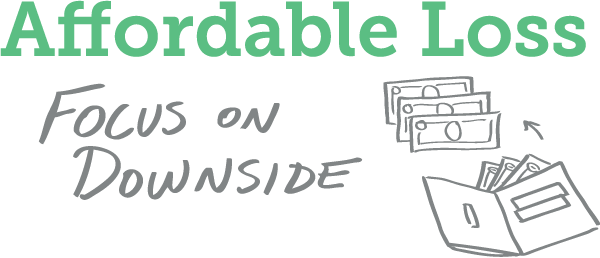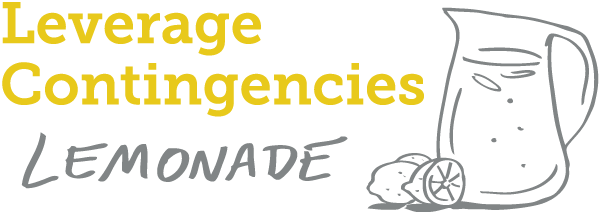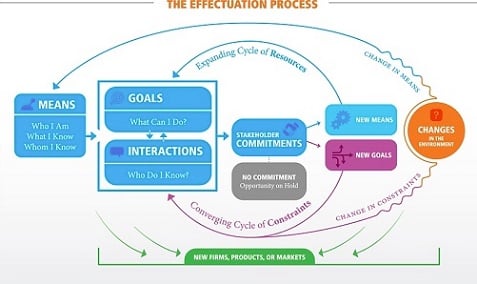The Five Principles of Effectuation

Bird In Hand Principle
When expert entrepreneurs seek to build a new venture, they start with their means. These means can be grouped into three categories:
- Who I am—my traits, tastes, and abilities
- What I know—my education, training, expertise, and experience
- Who I know—my social and professional networks.
Using a combination of these means, the entrepreneur begins to imagine possibilities and take action. Most often, she starts very small with the closest means and moves almost directly into implementation without elaborate planning (fire, aim versus aim, fire). With each action, possible outcomes are reconfigured. Eventually, certain emerging effects coalesce into clearly achievable and desirable goals—landmarks begin to appear on the blank map. The end goals are the combined result of the imagination and aspirations of the entrepreneur and the people she has interacted with during the process.
Here is a detailed explanation of the Bird in Hand Principle along with resources and case studies

Affordable Loss Principle
In much of the business world, the manager in charge of launching a new product analyzes the market and chooses segments with the highest expected value or return. It is a natural reflex that is the result of years of training around a single mantra: maximize returns by selecting the optimal strategy for your target. Expert entrepreneurs turn this logic on its head—they think in terms of affordable loss rather than expected returns. They decide what they are willing to lose rather than what they expect to make. Instead of calculating upfront how much money they will need to launch their project and investing time, effort, and energy in raising that money, the effectual entrepreneur tries to estimate the downside and examines what she is willing to lose. The entrepreneur then uses the process of building the project to bring other stakeholders on board and leverage what they can afford to lose together. An estimate of affordable loss does not depend on the venture but on the person. It varies from person to person and even across his or her life stages and circumstances. By allowing estimates of affordable loss to drive decisions about which venture to start, entrepreneurs stop depending on prediction. Instead, they focus on cultivating opportunities that have a low failure cost and that generate more options for the future. The combination enables cheap failure and learning that can be applied to the next iteration of the opportunity. This does not mean that entrepreneurs choose projects that won’t cost a lot if they fail—or that they do not expect to make a lot of money. It simply acknowledges that uncertain new venture opportunities are difficult to value upfront, whereas the investment of time, money, and other resources is quantifiable, manageable and controllable.
Here is a detailed explanation of the Affordable Loss Principle along with resources and case studies

Crazy Quilt Principle
The crazy quilt principle of effectual reasoning is the focus on building partnerships rather than beating competitors. Since entrepreneurs tend to start the process without assuming the existence of a predetermined market for their idea, they don’t know who their competitors will be, so detailed competitive analyses have little value. Instead, entrepreneurs generally take the product to the nearest potential customer. Some of the people they interact with make a commitment to the venture, committing time and/or money and/or resources and, thus, self-select into the new-venture creation process. The partnership principle dovetails well with the affordable loss principle to bring the entrepreneur’s idea to market with very little cash expenditure. Obtaining pre-commitments from key stakeholders, suppliers or customers helps reduce uncertainty in the early stages of creating an enterprise. Finally, since the entrepreneur is not wedded to any particular market for his or her idea, the expanding network of strategic partnerships determines, to a great extent, which market or markets the company will eventually end up entering or creating.
Here is a detailed explanation of the Crazy Quilt Principle along with resources and case studies

Lemonade Principle
If you come across lemons, make lemonade, lemon cake and everything else! The fourth principle of effectual reasoning is at the heart of entrepreneurial expertise—the ability to turn the unexpected into the profitable. Expert entrepreneurs learn not only to work with surprises but also to take advantage of them. In most contingency plans, surprises are bad—the worst-case scenarios. But because entrepreneurs do not tie their idea to any theorized or preconceived “market,” anything and everything is potentially a surprise that can lead to a valuable opportunity.
Here is a detailed explanation of the Lemonade Principle along with resources and case studies

Pilot in the Plane Principle
The pilot in the plane principle emphasizes the importance of control, co-creation, and shaping the future in uncertain entrepreneurial environments. Effectual entrepreneurs, like pilots controlling an aircraft, steer their ventures by leveraging the resources they have at their disposal. However, they do not navigate alone. They actively engage in co-creation with other "pilots" – stakeholders, partners, and customers – who bring their own unique resources and perspectives to the venture. Through this collaborative process, entrepreneurs can access a wider range of means and create new opportunities that may not have been possible individually.
Rather than simply adapting to the future, effectual entrepreneurs strive to create it. They do not rely on predictions or extensive planning but instead focus on shaping the future through actions and decisions with self-selected co-creators who also steer the venture. By leveraging their available means and working with others, entrepreneurs can actively mold their entrepreneurial journey and construct the future they desire.
The pilot in the plane principle encourages entrepreneurs to embrace their agency and take control of their ventures in the face of uncertainty. It emphasizes the power of co-creation, recognizing that successful ventures are built through collaborative efforts. By shaping the future rather than merely adapting to it, entrepreneurs can create innovative solutions and drive their ventures forward.
Here is a detailed explanation of the Pilot in the Plane Principle along with resources and case studies

Effectual Cycle
The entrepreneur’s means provide the starting point. The action begins in earnest when the entrepreneur begins interacting with people. Sometimes the starting point of that interaction is an idea, a provisional goal the entrepreneur uses to initiate the interaction. Sometimes the interaction is specifically initiated in the terms of “what can we do?” as the entrepreneur determines possibilities together with the person she interacts with. Regardless, each interaction can terminate without a commitment. In that case, the opportunity, as the entrepreneur and that specific person she interacts with envisioned, is on hold. Alternatively, that interaction might result in a commitment. As we described upfront, those commitments have two effects. One effect of adding a stakeholder to the venture is the addition of that stakeholder’s means—the possibilities those means suggest. At the same time, new goals also accompany the commitment, adding to the constraints accumulated by the venture and converging it toward a specific direction. At any time in this cycle, unexpected events, information and meetings can change the environment the venture is developing. Those contingencies have similar effects to commitments. On one hand, they present new resources—new means the entrepreneur can use to expand the possibilities of the venture. On the other hand, they present new constraints also, perhaps sending the venture in a more specific direction.

Here is a detailed explanation of the Effectuation Cycle along with resources and case studies
.png?width=200&height=82&name=Effectuation%20Extended%20Logo%20(200%20%C3%97%2082%20px).png)




